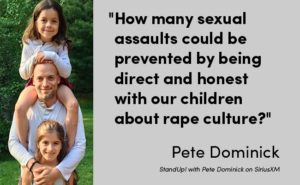Originally published on Care2.com on June 17, 2016 By Pete Domick.
Dear parents:
We need to talk. We need to talk to our sons. We need to talk to our daughters. We need to talk about rape culture.
As a radio host and comedian I know how little attention this issue gets. As a father, I’m heartbroken that it doesn’t receive more airtime from celebrities, entertainers and other public figures. And when it does receive airtime, the messages that the media settles on are often far from ideal.
I am a father of two daughters. Being their father is both endlessly inspiring and also terrifying. Reading countless parenting books and talking with many different fathers about their experiences still hasn’t equipped me with the tools to ensure they will not become one of the statistics that plague our country:
One out of every six American women will be the victim of a completed or attempted rape in her lifetime.
However, as my daughters get older, I’ve become particularly aware of the nuances of rape culture — especially when it comes to how the media is failing my girls.
Failure number one: how widespread sexual myths and violence against women are in popular movies, TV shows and video games.
How are young men and boys supposed to reconcile being told that women and girls should be respected when they are seeing them beaten, raped, and victimized whenever they turn on the TV? It’s incredibly pervasive, and sometimes the horror of what’s happening to the victim is hidden behind the glamorization of the rapist.
The media also perpetuates unhealthy myths that shape our kids’ understanding of their own sexuality. These myths include, but are not limited to: men think about sex all the time and have “uncontrollable urges”; rape against men is funny; and anger is a “turn on.”
Consent Ed compiled a video highlighting these pervasive myths in the media.
Failure number two: terminology.
Often, news media outlets won’t even define rape as what it is. Referring to rape as “sex” or “non-consensual sex”– which is just a cop-out phrase for avoiding the word “rape” — is irresponsible and confuses a criminal act with something natural and enjoyable.
Some media outlets showed a reluctance to using the term “rape” and “Bill Cosby” in the same headline. “Cosby said he got drugs to give women for sex,” reads one headline — making Cosby’s admission sound like an idea for a fun night, rather than what it actually is — intention to rape.
Terminology is the simplest and often most egregious failure.
Failure number three: reserving sympathy only for those they see as the “perfect victim” — or worse, the attacker.
So many people only find a victim believable if she fits a stereotypical image (including being a “she”) and meets certain criteria for purity. This attitude is so damaging to survivors not only because the public puts stock in it, but because, as we have seen in the recent Brock Turner case, judges do, too.
Let’s not forget the issues with how offenders of sexual crimes are portrayed in the media and even the courts. Turner’s case is a glaring example of how attackers are given the benefit of the doubt, even after they have been convicted by a jury of their peers.
“All-American swimmer found guilty of sexually assaulting unconscious woman on Stanford campus,” read one headline from The Washington Post. The article goes on to say, “Turner was a member of Stanford’s varsity swim team, one of the best in the country. He was an All-American swimmer in high school in Ohio, so good that he tried out for the U.S. Olympic team before he could vote. Suddenly he was accused of rape” (emphasis mine).
How does one “suddenly” be accused of rape? By raping someone.
As many already know, the judge also had sympathy and gave Turner a lenient sentence of 6 months. Turner’s future was seen as too valuable to waste in prison, while his victim’s future seemed to be merely an afterthought.
How do we think it affects our daughters to hear these messages? For all of these reasons and more, we need to talk to our kids early and often about these issues so the media can’t shape their reality before we do.
This Father’s Day, I’m pledging to #TalkToMyKids about sexuality and consent — and I’m asking every father I know to do the same. It is not an easy thing to do, so if you find yourself wondering where to start, here are some suggestions and here are some tips for talking specifically with teens.
How many sexual assaults could be prevented by being direct and honest with our children about rape culture? It’s hard to say. However, I suspect that when dads skip these conversations, real and lasting damage can be done. Just look at how Turner’s father diminished the impact of his son’s crime by calling it “20 minutes of action.” His dismissive language reveals all you need to know about whether or not he ever had a conversation with his son about what “actions” constitute rape.
It’s up to us to change the shape of these conversations. Don’t wait. Take the pledge to #TalktoYourKids.
Pete Dominick is the host of “Stand Up with Pete Dominick” on SiriusXM’s Insight Channel. He previously developed and hosted “What the Week” on CNN. Dominick was the resident opener on Comedy Central’s “The Colbert Report” for six years and the back-up comedian for “The Daily Show with Jon Stewart.”
PLEDGE TO #TALKTOYOURKIDS ABOUT CONSENT AND SEXUAL ASSAULT
BY: PETE DOMINICK AND ERIC GLADER
TARGET: PARENTS AND FRIENDS OF PARENTS







